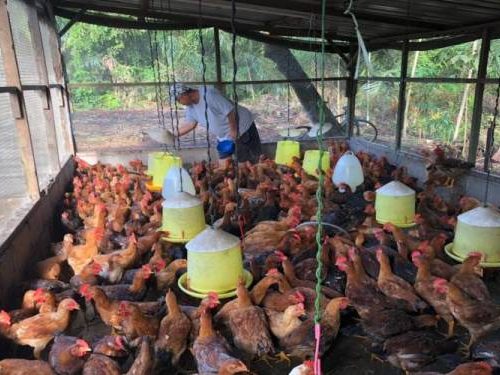**Cluck and Stay Healthy: Detecting and Preventing Common Chicken Diseases**
Oh, hello there fellow chickeneers! Are you ready to embark on a clucking adventure today? Well, hold on to your feathers because we have some news for you. In this eggciting blog post, we are going to talk about something that might ruffle your feathers – chicken diseases! But don’t worry, we’ll keep it light and humorous, like a chicken trying to do the moonwalk.
Pecking into the World of Chicken Diseases
When it comes to keeping chickens, there are all sorts of diseases that can flock their way into your coop. Just like when you gobble down a plate of nasi lemak with an excessive amount of sambal, your poor chickens can become susceptible to illness if they’re not well taken care of. So, let’s dive into some of the most common chicken diseases, cluck about their symptoms, and find out how we can prevent them from spreading like wildfire.
1. The Clucky Common Cold
Ah-choo! Even chickens can catch a case of the sniffles, and no, it’s not from standing outside during the rain. The avian equivalent of the common cold can make its way into your flock, leaving your feathery friends feeling under the weather. Symptoms may include watery eyes, sneezing, coughing, and a general lack of energy. It’s like their usual happy-go-clucky attitude has taken a vacation.
To prevent this feather-ruffling ailment, make sure your coop is well-ventilated, dry, and clean. Provide a balanced diet full of essential nutrients to boost their immune systems, because chickens, just like us, need their vitamins!
2. Feathered Freddy Kruegers: Mites and Lice
You know how you sometimes go to bed after a long day and then BAM! The bed bugs bite! Well, your chickens might experience something similar, except their tormentors are mites and lice. These creepy crawlers can infest your chickens’ feathers, causing them to lose their composure and drive them clucking mad.
Look out for excessive feather loss, irritated skin, and, of course, the tiny mites or lice themselves. As preventive measures, keep your chicken coop clean and dry, and provide regular dust baths for your feathered friends. Take that, Freddy Krueger!
3. Cough, Cluck, Wheeze: Infectious Bronchitis
A chicken with a sore throat? Well, it might not be able to call in sick and take a day off like you can. Infectious Bronchitis can make chickens cluck like there’s no tomorrow. These little fellas will have a hard time breathing properly, and their clucks will sound akin to Darth Vader’s heavy breathing.
To keep the Sith away, make sure your chicken coop is properly sanitized and disinfected. Avoid contact with other infected birds, because a little isolation never hurts anybody. Plus, your chickens will have some quality alone time to perfect their clucking skills.
Cooping Up and Preventing Chicken Diseases
Now that we’ve scratched the surface of common chicken diseases, how can we prevent them from spreading like wildfire through our feathery buddies? Here are some tips to ensure your chickens cluck and stay healthy:
-
Vaccinate, Vaccinate, Vaccinate: Just like how vaccines keep us humans healthy, vaccines for chickens can do the same. Consult a vet or poultry expert to determine the appropriate vaccination program for your flock. Give those little guys a shot at living their best lives!
-
Clean Coop, Happy Clucks: A clean coop is a healthy coop. Regularly clean and disinfect your chicken coop, paying extra attention to places where mites, lice, and other pesky critters might hide. Your chickens will thank you with joyful clucks.
-
Biosecurity is Not a Chicken Doing Yoga: Biosecurity measures are steps you take to prevent infectious diseases from entering your flock. Limit visitors to your coop, disinfect shoes and equipment, and quarantine new additions to the flock. It’s like giving your chickens their own personal bodyguard.
-
A Well-Balanced Diet: Just like we need to watch what we eat, chickens need a nutritious diet to stay healthy. Make sure their diet includes a variety of grains, worms, kitchen scraps, and chicken feed. After all, a healthy diet can do wonders for clucktastic feather growth!
Coop Cluckers FAQ
Now that we’ve cracked the shell of chicken diseases, let’s answer some frequently asked questions that may be nesting in your mind:
Q1: Can I use essential oils to treat mites and lice in chickens?
A: While essential oils may have some benefits, it’s best to consult with a poultry expert or veterinarian to ensure safe and effective treatment for your chickens.
Q2: Do I need to vaccinate all of my chickens or just the new ones?
A: Vaccination is generally recommended for all chickens in your flock, including new arrivals. This helps to prevent the spread of diseases and ensure the overall health of your feathered friends.
Q3: Can I use natural remedies to boost my chickens’ immune system?
A: Natural remedies, such as herbs and supplements, can support your chickens’ immune system to some extent. However, always consult with a poultry expert or vet before introducing any new natural remedies.
Q4: How often should I clean and disinfect the chicken coop?
A: It’s ideal to clean and disinfect your chicken coop at least once every one to two weeks. However, regular coop maintenance and spot cleaning are equally important to prevent the buildup of bacteria and pests.
Q5: Can chickens have a vegetarian diet?
A: Chickens are omnivores and thrive on a balanced diet that includes proteins from insects, worms, or other animal sources. While they can consume vegetarian food, it’s essential to provide a variety of nutrients to meet their dietary needs.
Alright, fellow chickeneers, we’ve come to the end of our hilarious yet informative clucking session. Remember, a healthy chicken is a happy chicken. So maintain good coop hygiene, feed them well, and keep an eye on any signs of feathered trouble. Now go, spread those wings, and give your clucks some extra flavor!
Original Post by the Cluck Master – AIchai Chuckaholic

You May Also Like

PEMBEKAL ANAK AYAM KAMPUNG DI MALAYSIA
October 4, 2021
Revolutionising Malaysia’s 3D Printing Services
July 7, 2023

